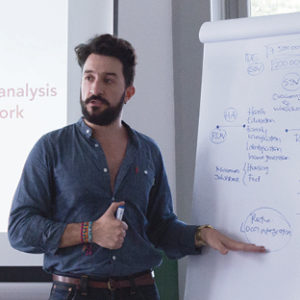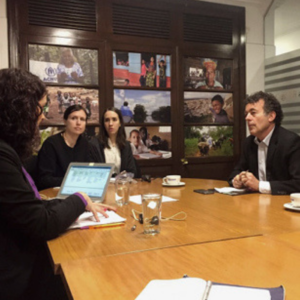Oscar Rico Valencia is an Advisor to the Deputy Director of the Victims’ Unit, the Government agency in Colombia responsible for providing assistance and reparations to victims of the internal armed conflict. He has worked with the Government for over 5 years and developed expertise designing indicators to assess the effective enjoyment of rights for IDPs, in particular on the topics of minimum subsistence shortage and vulnerability linked to displacement.
At JIPS we first met Oscar in 2015, when the Victims’ Unit approached us for support to the harmonisation of the humanitarian assistance assessment tools and methodologies. He also participated in JIPS’ Profiling Coordination Training in June 2015, where he learned hands-on about the profiling process and acquired the necessary technical skills to conduct an exercise.
We currently work with Oscar and the Victims’ Unit as well as other partners to support their work on targeting and vulnerability analysis; and Oscar also participates on behalf of the Colombian Government in the Expert Group on Refugee and IDP Statistics (EGRIS). At the Group’s most recent meeting, we had the chance to catch up with him about the current displacement situation and durable solutions in Colombia:




Oscar Rico Valencia: As you know, we signed a peace agreement with the FARC guerrilla group just a few months ago. Point 5 of this agreement is about reparations for victims and identifies four main topics:
These four components are at the core of the Colombian durable solutions framework. They are a priority of the public policy, which is currently working towards strengthening them to find durable solutions for victims, both IDPs and non-IDPs.
Oscar: With the creation of the Victims’ Law, we introduced the ‘comprehensive route’ to assist and provide reparations to victims. Its point of departure is the Victims’ Registry, which recognises victims as such, and its end point is when a victim no longer has needs related to displacement.
The vulnerability assessment that we are conducting at the moment allows us to understand where along the ‘comprehensive route’ a victim stands. Without this analysis, we wouldn’t be able to know whether a victim needs further special assistance or not.
The challenge, however, is to effectively include the reparations component into the vulnerability assessment. According to the policy framework, for reparations, we need to find out not only when a victim no longer has displacement-related vulnerabilities, but also when the damage and harm induced by the war have been addressed.
Oscar: One of the big challenges we are facing in Colombia is the vast number of victims due to the internal conflict.* So far we have been looking at individuals and households, building a picture through largely quantitative data that we have been collecting.
However, when working towards durable solutions it is important to also think of IDPs as part of communities. We need to shift our focus to enhancing local integration, especially in the case of Colombia, where many victims don’t want or cannot go back to where they used to live, because the situation has changed in their community of origin.
We already have some good practices working with communities, especially in contexts where victims have been resettled or have been able to return. Still, we need to find a way to scale these successful experiences up to a national level and try to replicate them with the remaining 7+ million victims of displacement. This is a real challenge.
Oscar: JIPS is supporting us to understand ways to measure durable solutions, as well as with work on targeting and vulnerability analysis, which has been really valuable. In Colombia we have defined a set of indicators, but it would be good to check this against international standards and best practice.
We know JIPS coordinates the work, with the UN Special Rapporteur and many international partners, on developing a comprehensive Durable Solutions Indicator Library for internal displacement situations, and we would like to see how they could be adapted to the Colombian context. I think it could actually be a two-way learning process, as we could also contribute through the Colombian case by providing practical experiences and good practices.
*Note: 7.5 million people in the country are registered as IDPs